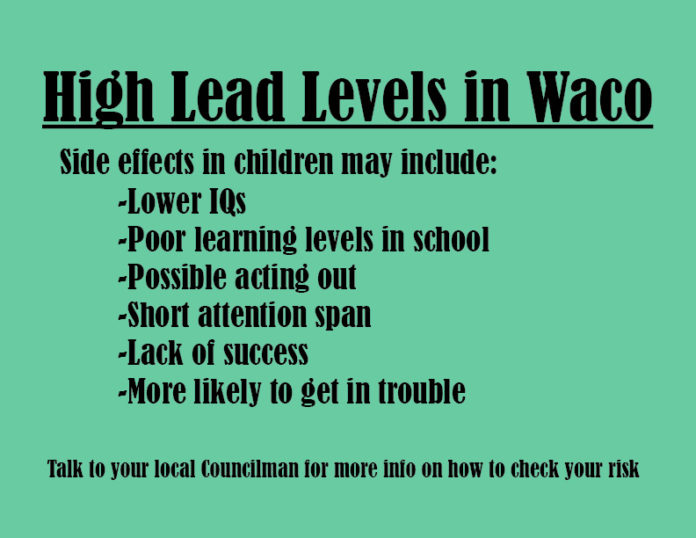By Brooke Hill | Staff Writer
The toxic levels of lead in children’s blood levels in Flint, Mich., sparked outrage when discovered. Here in Waco, 17.6 percent of children in the 76707 zip code were found to have levels of lead higher than five micrograms per deciliter, which is the amount that is considered dangerous according to federal guidelines.
“Most people don’t realize that lead is still an issue in our community, our surrounding states,” said Kelly Craine, public information specialist for the Waco-McLennan County district. “When we think of lead toxicity or lead poisoning, typically people think of Flint, Michigan, and water. However, there are still issues with lead surrounding lead paint, specifically in homes, and it also ends up contaminating the ground around the homes.”
Craine said that one problem with extracting lead is that the city doesn’t have the authority to go to someone’s home and ask to test their home for lead. They lack the opportunity or authority to tell people to correct the lead issue. The city also does not receive any information if someone is tested positive for elevated lead levels. The Department of State Health Services gets that information.
Craine said that the city has two main goals: to work with the state to start receiving information so they can know who has lead in their blood and how they can help them, and to create an ordinance for the City of Waco that would give them the authority to remediate lead — whether that requires painting over it, changing out windows and door frames, or other remedies.
Lead paint was banned in 1978 after it was found to cause various health problems. The main problem that lead causes brain defection in children. Craine said these effects like won’t be apparent for some time and could go misdiagnosed for years because effects include lower IQs, poor learning levels in school, acting out, not paying attention, not performing well in school, being more likely to get in trouble and having emotional issues.
The Centers for Disease Control and Prevention and the U.S. Department of Housing and Urban Development have listed five micrograms per deciliter of blood of lead as cause for concern and recommendation for response. The state of Texas defines that level as 20 micrograms; 45 micrograms is considered lethal.
Craine said she plans to talk with the City of Houston’s lead program Monday to understand how their program works, in hopes of creating something similar for Waco.
The U.S. Department of Housing and Urban Development has grants that would help fix problems in homes. Craine said the city is able to apply for a grant, which would help to fix potential lead problems.
“These are older homes, so the opportunity to get a grant to help people who may be low income to remove the lead from their home would be a wonderful opportunity,” Crain said.
Waco Councilman John Kinnaird, who heads the health district board, says more data is necessary before moving forward in the process.
“The data that we initially received a few months ago was fairly incomplete,” Kinnaird said. “The first step is to get more details, location-specific and robust data to really kind of understand the scope of the problem and understand where it is so that we can efficiently and as effectively as possible put our resources to work to help remediate the problem of children being exposed to lead in the neighborhood.”
Kinnaird said he hasn’t received many complaints from the community, but the few he has are generally concerned people who want to make sure they themselves aren’t at risk.
“The response we’ve gotten from the neighborhood has been one of interest and a little concern, and also appreciation that we are working toward finding a solution,” Kinnaird said. “Once we have data and can identify a specific household or area that has higher incidents of lead levels, the goal is to identify funding sources and remediation steps.”






